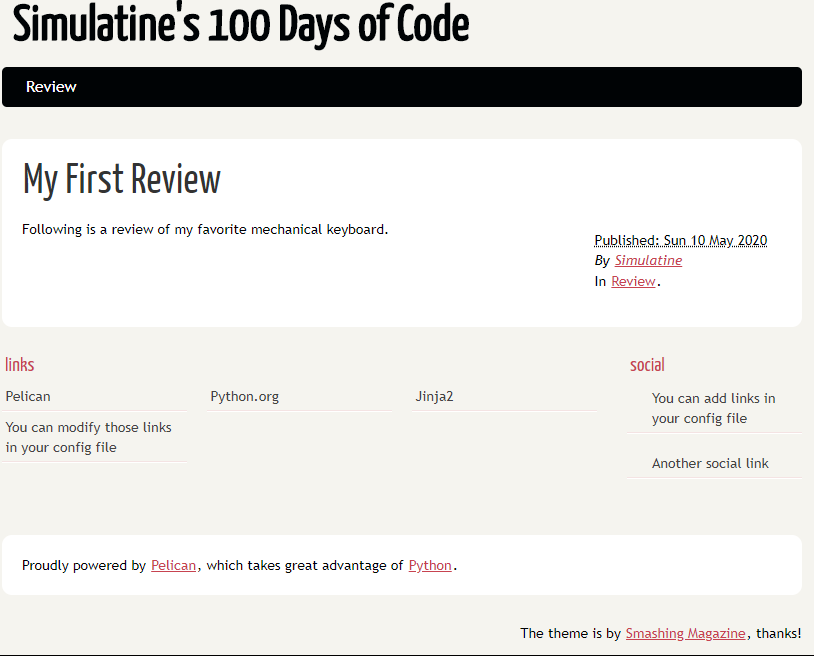Trying Pelican
I am trying out using Pelican to create this site, as a replacement for Jekyll with the Minima theme, provided by default with GitHub Pages. Pelican is a static site generator, and is conceptually very similar to Jekyll - it converts simple text files in Markdown format into a fully fledged website. But Pelican is Python based, which feels a lot more natural to me.
Installing Pelican
I started by installing the pelican and markdown libraries:
pip install pelican markdown
I then followed instructions at the Pelican quickstart guide to create and configure my site.
I first created a folder for my website:
mkdir C:\Users\Simulatine\Documents\Git\100DaysOfCode\web
I went to the website folder and ran pelican-quickstart to create the initial structure
cd C:\Users\Simulatine\Documents\Git\100DaysOfCode\web
pelican-quickstart
Welcome to pelican-quickstart v4.2.0.
This script will help you create a new Pelican-based website.
Please answer the following questions so this script can generate the files
needed by Pelican.
> Where do you want to create your new web site? [.]
> What will be the title of this web site? Simulatine's 100 Days of Code
> Who will be the author of this web site? Simulatine
> What will be the default language of this web site? [English]
> Do you want to specify a URL prefix? e.g., https://example.com (Y/n) Y
> What is your URL prefix? (see above example; no trailing slash) https://simulatine.github.io/100DaysOfCode/
> Do you want to enable article pagination? (Y/n)
> How many articles per page do you want? [10]
> What is your time zone? [Europe/Paris] Europe/London
> Do you want to generate a tasks.py/Makefile to automate generation and publishing? (Y/n)
> Do you want to upload your website using FTP? (y/N)
> Do you want to upload your website using SSH? (y/N)
> Do you want to upload your website using Dropbox? (y/N)
> Do you want to upload your website using S3? (y/N)
> Do you want to upload your website using Rackspace Cloud Files? (y/N)
> Do you want to upload your website using GitHub Pages? (y/N) Y
> Is this your personal page (username.github.io)? (y/N) n
Done. Your new project is available at C:\Users\Simulatine\Documents\Git\100DaysOfCode\web
This created subfolders called content and output, as well as a Makefile and some default Python scripts pelicanconf.py, publishconf.py and tasks.py.
dir
Volume in drive C has no label.
Volume Serial Number is 5C84-C174
Directory of C:\Users\Simulatine\Documents\Git\100DaysOfCode\web
2020-05-10 15:34 <DIR> .
2020-05-10 15:34 <DIR> ..
2020-05-10 15:11 <DIR> content
2020-05-10 14:54 2,914 Makefile
2020-05-10 15:17 <DIR> output
2020-05-10 15:23 878 pelicanconf.py
2020-05-10 14:54 632 publishconf.py
2020-05-10 14:54 3,615 tasks.py
4 File(s) 8,039 bytes
4 Dir(s) 51,526,713,344 bytes free
As suggested in the
quickstart guide,
I next created a trial web source page keyboard-review.md in the content
folder, with some markdown content:
Title: My First Review
Date: 2020-05-08 10:20
Category: Review
Following is a review of my favorite mechanical keyboard.
I attempted to generate the site output by going to the top website folder and
running pelican against the content folder.
pelican content
I received the following notification:
WARNING: Docutils has no localization for 'english'. Using 'en' instead.
ERROR: Skipping C:\Users\Simulatine\Documents\Git\100DaysOfCode\web\content\keyboard-review.md: could not find information about 'title'
Done: Processed 0 articles, 0 drafts, 0 pages, 0 hidden pages and 0 draft pages in 0.62 seconds.
Hmm . Two immediate errors. It turns out that the default language choice "English" in pelican-quickstart should have been "en". I had to go to pelicanconf.py, and change the line:
DEFAULT_LANG = 'English'
To
DEFAULT_LANG = 'en'
I also realised the pelican was not finding the 'title' metadata in my initial
file. After some investigation, I noticed that when I copied and pasted the
suggested initial file contents from the pelican quickstart guide into my
Markdown editor Typora, it converted it to a code block by automatically adding
triple backticks before and after the pasted text. So my Markdown file
contents in keyboard-review.md were actually:
```
Title: My First Review
Date: 2020-05-08 10:20
Category: Review
Following is a review of my favorite mechanical keyboard.
```
I had to remove the leading and trailing backtick lines and resave the markdown file. I could then retry generating the site output:
pelican content
Done: Processed 1 article, 0 drafts, 0 pages, 0 hidden pages and 0 draft pages in 0.31 seconds.
This time it worked! I had an entire web site in the output folder. I was
expecting possibly a single HTML file, but it actually created a significant
amount of boilerplate output. I was able to view a local copy of the website
by launching the pelican built-in web server
pelican --listen
Once this was running, I could preview the site by navigating to the URL http://localhost:8000/ on my local browser:

Excellent! I like how this appears, and it took maybe 20-30 minutes to get this up and running.
Publish to GitHub Pages
I was immediately sold on Pelican - I now wanted to publish this publicly to my GitHub Pages site.
I followed the instructions in the Pelican docs
First of all, I installed the Python ghp-import tool
pip install ghp-import
I used ghp-import to create a local gh-pages branch with the content of the
output folder. If the branch already exists, this command will update the
branch with the latest files in output.
ghp-import output
I then pushed the gh-pages branch from my local desktop to my GitHub
repository
git push origin gh-pages
Finally, I went to my GitHub repository and in Settings, GitHub Pages, I changed the source from the Master branch docs folder (used by Jekyll) to the gh-pages branch.
My site was now visible at https://simulatine.github.io/100DaysOfCode/
I finally cleaned up my old Jekyll site by deleting everything in the old docs
folder with git rm, and resyncing my repository:
git push origin master
Conclusion
I found Pelican to be simple to use, and a lot more Pythonesque than Jekyll. I'll be sticking with this for a while.
